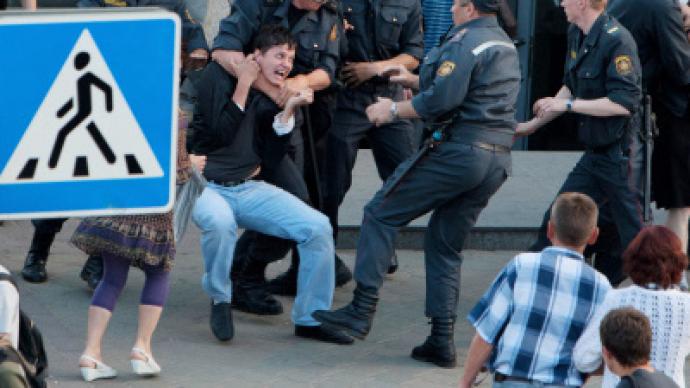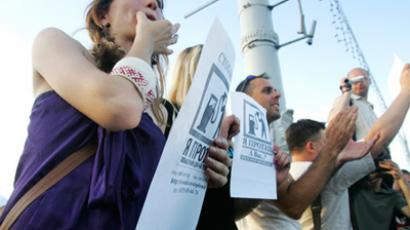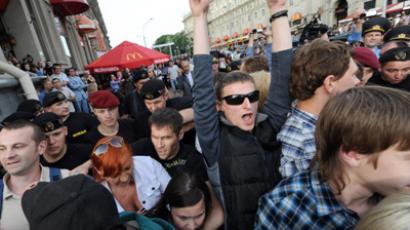Hundreds detained in Belarus Social Network Revolution

Belarus human rights activists say that police detained at least 400 people at the “Revolution through social networks” protest rallies in Minsk and several other cities.
The demonstrations took place on Wednesday night and were named “revolution through social networks” as its participants arranged and coordinated their actions through various social networks on the internet. They also used the same social networks to report on police reactions to the protests. The data was then gathered by Belarus human rights NGO Vesna (Spring) and posted on its web-site.The largest rally took place in Minsk, and according to various estimations, the number of protesters spanned anywhere from several hundred to several thousand people. Police detained about 200 demonstrators, HR activists report. They also said that an additional 200-250 people were detained in other Belarusian cities and towns. Police have not yet released the official data for Wednesday’s protests.Police also detained four journalists who were covering the demonstrations. Those detained include Ruslan Rindevich, who works for the Rusian news agency Interfax, Oleg Gruzdilovich of the Radio Liberty, Pavel Podobed of the Belarus news agency BelaPAN and Aleksandr Piletsky from the Nasha Niva newspaper. Some sources put the number of the detained journalists at five. The reporter for the Russian news agency Interfax was released after spending some time at a police station, though the police have not registered his detention (meaning that they do not intend to start a criminal or administrative case against him). On Thursday afternoon, the Interior Ministry’s directorate for the city of Minsk issued an official release which stated that all reporters who were detained on Wednesday had been released without being arrested or charged. Also, some Belarusian media outlets said that the acting head of the Swedish diplomatic mission in Belarus was among those detained. The police said they had no information about any such incidents, but added that though diplomats enjoy the immunity and other privileges, they also must strictly observe the rules of the host country.The calls for silent protest began spreading through Belarusian social networks about a month ago. The organizers asked the citizens who disagreed with the authorities’ current course to take to the streets every Wednesday and stand there in silence so that the rally could not be identified as an illegal demonstration. At first, only few people took part in the silent protest rallies, but on June 22 enough protesters took to the streets to prompt a response from the police.Some observers noted that the Belarussian police acted rather harshly by detaining not only protestors, but also people who were simply passing by.Ahead of the event, Belarusian law enforcement launched their own campaign on the internet in which they warned those who intended to take part in street protests and asked them to observe certain rules – for example not to ask the police officers to explain their actions and not to carry weapons at demonstrations.President Aleksandr Lukashenko said at a major press conference last week that he was not going to allow any unsanctioned rallies in central Minsk.“I will listen to you but do not oppose the law and the authorities. If you do – the proper reaction will follow,” Lukashenko told his political opponents.The Belarussian economy is currently in deep crisis after the government devalued the national currency and made attempts to close their market to foreign imports.The last series of major protests shook Belarus in December 2010 on the day of the presidential election. Then, thousands of protesters, headed by presidential candidates who lost the race to Lukashenko, held a rally and tried to break into the building housing the elections committee.Law enforcers dispersed the protesters and arrested many of them. Several former presidential candidates were later sentenced to terms in prison, some received suspended sentences and others had to flee the country.














